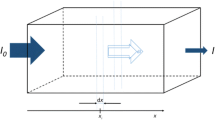Abstract
We study time integration methods for equations of mixed quantum-classical molecular dynamics in which Newtonian equations of motion and Schrödinger equations are nonlinearly coupled. Such systems exhibit different time scales in the classical and the quantum evolution, and the solutions are typically highly oscillatory. The numerical methods use the exponential of the quantum Hamiltonian whose product with a state vector is approximated using Lanczos' method. This allows time steps that are much larger than the inverse of the highest frequencies.
We describe various integration schemes and analyze their error behaviour, without assuming smoothness of the solution. As preparation and as a problem of independent interest, we study also integration methods for Schrödinger equations with time-dependent Hamiltonian.
Similar content being viewed by others
REFERENCES
G. Benettin and A. Giorgilli, On the Hamiltonian interpolation of near to the identity symplectic mappings with application to symplectic integration algorithms, J. Statist. Phys., 74 (1994), pp. 1117–1143.
S. R. Billeter and W. F. van Gunsteren, A modular molecular dynamics/quantum dynamics program for non-adiabatic proton transfers in solution, Comp. Phys. Comm., 107 (1997), pp. 61–91.
F. A. Bornemann, P. Nettesheim, and Ch. Schütte, Quantum-classical molecular dynamics as an approximation to full quantum dynamics, J. Chem. Phys., 105 (1996), pp. 1074–1083.
P. Deuflhard, J. Hermans, B. Leimkuhler, A. Mark, S. Reich, and R. D. Skeel, eds., Computational Molecular Dynamics: Challenges, Methods, Ideas, Lecture Notes in Computational Science and Engineering 4, Springer, Berlin, 1999.
V. L. Druskin and L. A. Knizhnerman, Krylov subspace approximations of eigenpairs and matrix functions in exact and computer arithmetic, Numer. Lin. Alg. Appl., 2 (1995), pp. 205–217.
B. García-Archilla, J. M. Sanz-Serna, and R. Skeel, Long-time-step methods for oscillatory differential equations, SIAM J. Sci. Comput., 20 (1999), pp. 930–963.
E. Hairer and Ch. Lubich, The life-span of backward error analysis for numerical integrators, Numer. Math., 76 (1997), pp. 441–462.
M. Hochbruck and Ch. Lubich, On Krylov subspace approximations to the matrix exponential operator, SIAM J. Numer. Anal., 34 (1997), pp. 1911–1925.
M. Hochbruck and Ch. Lubich, A bunch of time integrators for quantum/classical molecular dynamics, in J. Hermans, B. Leimkuhler, A. Mark, S. Reich, and R. D. Skeel, eds., Computational Molecular Dynamics: Challenges, Methods, Ideas, Lecture Notes in Computational Science and Engineering 4, Springer, Berlin [4], 1999, pp. 421–432.
M. Hochbruck and Ch. Lubich, A Gautschi-type method for oscillatory second-order differential equations, Numer. Math., 83 (1999), pp. 403–426.
M. Hochbruck, Ch. Lubich, and H. Selhofer, Exponential integrators for large systems of differential equations, SIAM J. Sci. Comput., 19 (1998), pp. 1552–1574.
A. Iserles and S. P. Nørsett, On the solution of linear differential equations in Lie groups, Phil. Trans. Royal Soc. A, 357 (1999), pp. 983–1020.
T. Jahnke, Splittingverfahren für Schrödingergleichungen, Diploma Thesis, Univ. Tübingen, 1999.
R. Kosloff, Propagation methods for quantum molecular dynamics, Annu. Rev. Phys. Chem., 45 (1994), pp. 145–178.
C. Lanczos, An iteration method for the solution of the eigenvalue problem of linear differential and integral operators, J. Res. Nat. Bureau Standards, 45 (1950), pp. 255–281.
W. Magnus, On the exponential solution of differential equations for a linear operator, Comm. Pure Appl. Math., 7 (1954), pp. 649–673.
P. Nettesheim, F. A. Bornemann, B. Schmidt, and Ch. Schütte, An explicit and symplectic integrator for quantum-classical molecular dynamics, Chem. Phys. Lett., 256 (1996), pp. 581–588.
P. Nettesheim and S. Reich, Symplectic multiple-time-stepping integrators for quantum-classical molecular dynamics, in J. Hermans, B. Leimkuhler, A. Mark, S. Reich, and R. D. Skeel, eds., Computational Molecular Dynamics: Challenges, Methods, Ideas, Lecture Notes in Computational Science and Engineering 4, Springer, Berlin [4], 1999, pp. 412–420.
P. Nettesheim and Ch. Schütte, Numerical integrators for quantum-classical molecular dynamics, in J. Hermans, B. Leimkuhler, A. Mark, S. Reich, and R. D. Skeel, eds., Computational Molecular Dynamics: Challenges, Methods, Ideas, Lecture Notes in Computational Science and Engineering 4, Springer, Berlin [4], 1999, pp. 396–411.
T. J. Park and J. C. Light, Unitary quantum time evolution by iterative Lanczos reduction, J. Chem. Phys., 85 (1986), pp. 5870–5876.
B. N. Parlett, The Symmetric Eigenvalue Problem, Prentice-Hall, Englewood Cliffs, NJ, 1980.
M. Paule, Integratoren für das QCMD Modell, Diploma Thesis, Univ. Tübingen, 1998.
U. Peskin, R. Kosloff, and N. Moiseyev, The solution of the time dependent Schrödinger equation by the (t, t′) method: The use of global polynomial propagators for time dependent Hamiltonians, J. Chem. Phys., 100 (1994), pp. 8849–8855.
S. Reich, Dynamical systems, numerical integration, and exponentially small estimates, Habilitation Thesis, FU Berlin, 1998.
S. Reich, Multiple time-scales in classical and quantum-classical molecular dynamics, J. Comp. Phys., 151 (1999), pp. 49–73.
H. Tal-Ezer and R. Kosloff, An accurate and efficient scheme for propagating the time-dependent Schrödinger equation, J. Chem. Phys., 81 (1984), pp. 3967–3971.
H. Tal-Ezer, R. Kosloff, and C. Cerjan, Low-order polynomial approximation of propagators for the time-dependent Schrödinger equation, J. Comp. Phys., 100 (1992), pp. 179–187.
Y. Saad, Analysis of some Krylov subspace approximations to the matrix exponential operator, SIAM J. Numer. Anal., 19 (1992), pp. 209–228.
Author information
Authors and Affiliations
Rights and permissions
About this article
Cite this article
Hochbruck, M., Lubich, C. Exponential Integrators for Quantum-Classical Molecular Dynamics. BIT Numerical Mathematics 39, 620–645 (1999). https://doi.org/10.1023/A:1022335122807
Issue Date:
DOI: https://doi.org/10.1023/A:1022335122807




